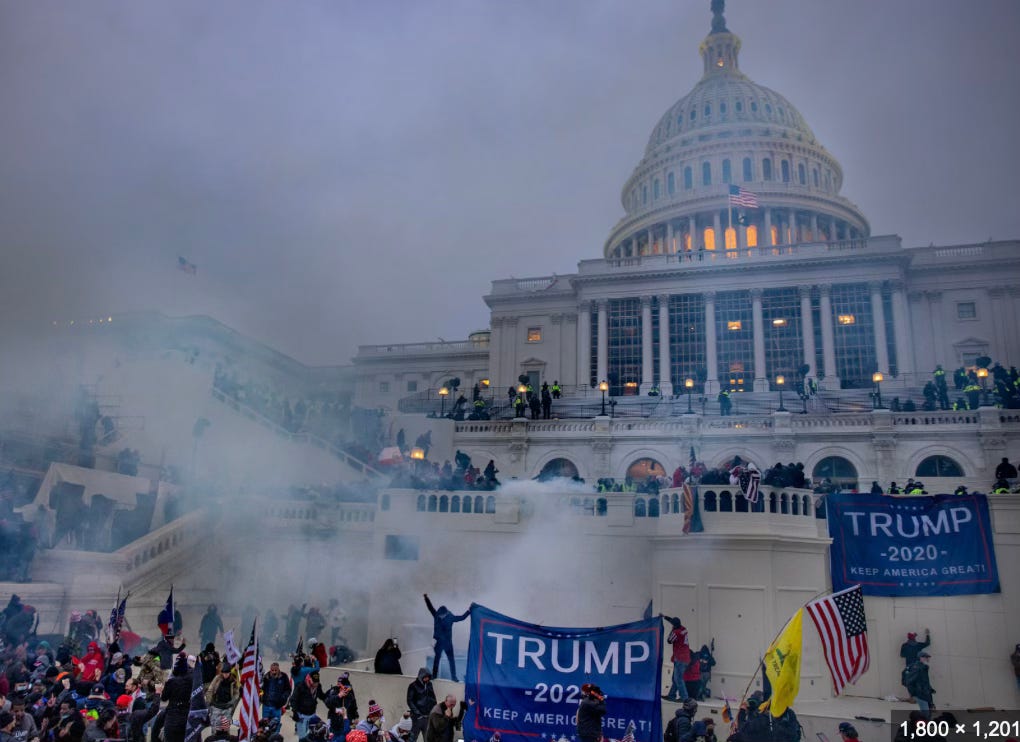Written on January 6, 2021, as the Capitol riots unfolded, Attempted Coup on Capitol Hill captured the shock and disbelief of watching democracy under siege. It was an article shaped by the urgency of the moment and a desire to draw parallels between the United States and the United Kingdom. Now, four years later, we revisit that piece—its insights, its prescience, and how its themes resonate today.
Plague Island and the United States of Amnesia
The original article began by comparing the UK and the USA, framing both nations within narratives of denial and decline. Borrowing Gore Vidal’s term, we called the USA the United States of Amnesia:
If we’re Plague Island, then the USA, the only country in the Western Hemisphere who have handled the pandemic on par with us, has to be given an alternative name, too. The late, great Gore Vidal once called his country ‘The United States of Amnesia,’ and I think it’s appropriate to borrow the name from someone who lived the experience of being American. He said in 2004, ‘We are the United States of Amnesia, we learn nothing because we remember nothing.’
This framing highlighted a shared reluctance to confront history honestly. America rewrites or erases uncomfortable truths, while the UK indulges in nostalgia for its imperial past, avoiding the accountability such introspection demands. As we wrote:
That name [United States of Amnesia] seems to fit well as, like us, the USA is a country who likes to propagate its innocence. For example, many don’t seem to understand why minority groups may feel unhappy with how they and/or their ancestors were treated in the country.
Looking back, this comparison feels even sharper. Both nations continue to use myths of innocence and exceptionalism to shield themselves from uncomfortable realities. The article also pointed out a significant difference:
Perhaps the biggest difference between Plague Island and the United States of Amnesia, though, is that for us, our island is all about what once was, and what was great about that. For the big country, it’s all about the here and now: the truth about the past is forgotten, denied or remembered in a different way.
Four years later, this distinction remains pertinent. While the UK clings to a rose-tinted view of its imperial past, America’s focus on the present has enabled dangerous revisionism. The Capitol riots, initially condemned as an attack on democracy, are now rebranded by some as acts of patriotism, a stark reminder of how quickly memory can be manipulated.
From 'Caveat King' to Keir Starmer and Nigel Farage
In Attempted Coup on Capitol Hill, we drew a parallel between Donald Trump and then-Prime Minister Boris Johnson, referring to Johnson as the ‘Caveat King.’ It reflected his populist leadership style: opportunistic, chaotic, and built on a foundation of untruths. As we wrote:
As people from Plague Island watch these developing events, we have nothing to feel smug about. We have our own Trump, and his name is Caveat King.
Four years later, the political landscape in the UK has shifted. Johnson has been replaced as Prime Minister by Keir Starmer, whose leadership style stands in stark contrast to his predecessor. Starmer’s measured, technocratic approach is far removed from Johnson’s blustering populism. However, the UK’s identity crisis remains unresolved, and the forces unleashed by Johnson’s tenure continue to shape the nation.
Johnson’s downfall, unlike Trump’s electoral defeat, was not due to a loss of popular support but his inability to sustain the web of lies that had propped up his leadership. His tenure was marked by scandal after scandal, from Partygate to cronyism, culminating in his party ousting him as the lies became too numerous, too blatant, and too difficult to hide.
Yet the vacuum left by Johnson in the populist stakes has not gone unfilled. Enter Nigel Farage, who has returned to the forefront of UK politics, positioning himself as the new champion of populist grievances. While Johnson relied on charm and obfuscation to maintain his grip on power, Farage’s approach is more direct, stoking fears of immigration, cultural change, and ‘globalist’ elites. His rhetoric echoes Trumpism more closely than Johnson’s ever did, trading in division and resentment while offering little in the way of solutions.
Farage’s ascendency highlights a critical parallel with the USA. Just as Trumpism outlived Trump, the forces of Brexit and populism have outlived Johnson. If Johnson was our Trump, then Farage is the heir to his populist legacy—more radical, more confrontational, and arguably more dangerous in his appeal to disillusioned voters. Meanwhile, Starmer, much like Biden in the USA, must contend with the fallout of this populist wave, seeking to steady a ship that remains battered by years of division and disinformation.
Trump’s Words and the Coup
In Attempted Coup on Capitol Hill, we scrutinized Trump’s speech to the rioters, noting its dangerous contradictions:
I know your pain; I know your hurt. We had an election that was stolen from us. It was a landslide election, and everyone knows it, especially the other side,” Trump said. “But you have to go home now. We have to have peace. We have to have law and order […] We can’t play into the hands of these people. We have to have peace. So go home. We love you; you’re very special.
We observed then how Trump’s call for peace was laced with validation of the mob’s grievances:
In my mind, every time that man says, ‘go home,’ he’s winking to the crowd.
Looking back, this analysis holds. Trump’s words were not a disavowal of violence but a nod to the mob’s cause, reinforcing the lies that drove them to the Capitol. Far from being the ‘last kick of Trump’s dying mule,’ as we speculated, the Capitol riots marked the beginning of a new phase of Trumpism—one defined by disinformation, grievance politics, and ongoing attempts to undermine democracy.
Brexit and the Fantasy of Power
The article also drew parallels between Brexit and Trumpism, framing both as nostalgic fantasies:
‘Plague Island was powerful once. It wants desperately to be that powerful again. At the heart of it really, that was the fantasy that Brexit was selling us. Indeed, it is as if joining the European Union was some national emasculation and that we would regain our vigour once independent again.’
Four years on, this observation feels even more relevant. Brexit’s promises of sovereignty and restored greatness have largely failed to materialize, leaving the UK economically weakened and politically isolated. Yet, like Trump’s ‘Make America Great Again,’ the fantasy of Brexit continues to resonate, masking its failures with rhetoric of independence and nostalgia.
A Collapsing Star
We concluded Attempted Coup on Capitol Hill with a note of cautious optimism:
May the sun be setting on Trumpland, another falling empire, collapsing in on itself like a dying star, ready to be reborn.
Four years later, this hope feels harder to summon. While Trump left office, the forces he unleashed—grievance politics, disinformation, and authoritarianism—remain entrenched. Similarly, the UK’s struggles with Brexit’s aftermath and its identity crisis show little sign of resolution.
Final Reflections
Revisiting Attempted Coup on Capitol Hill reminds us of the urgency of that moment and the enduring challenges it illuminated. Both the UK and the USA face deep divisions and identity crises rooted in their respective histories. The work of confronting these issues—of moving beyond nostalgia, denial, and amnesia—remains as critical as ever.
As we wrote then:
The question that lingers is whether either nation can escape the cycles of forgetting and denial to forge a more honest, equitable future—or whether they will remain trapped in their respective fantasies, unable to move forward.
Four years on, that question feels more pressing than ever and the answers remain uncertain.






